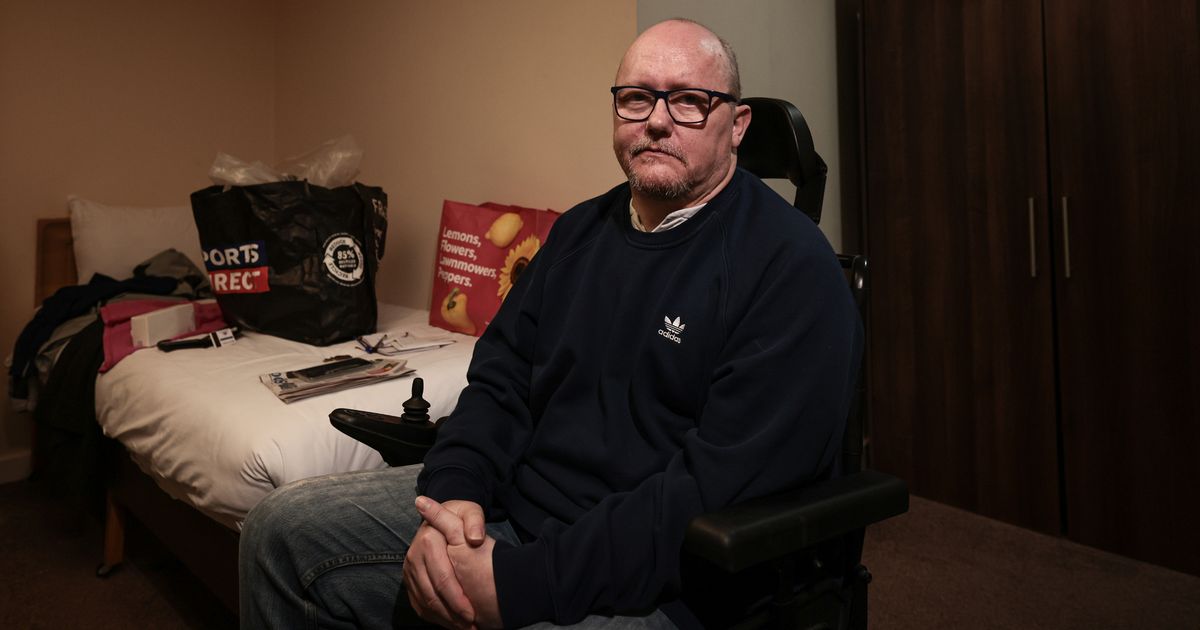“I know a lot of people won’t have any sympathy for me, and I understand it”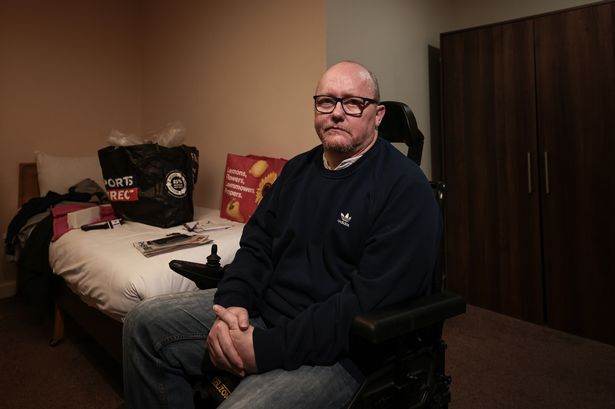 Stephen Kidd was convicted of joint enterprise murder in 2009(Image: Kenny Brown | Manchester Evening News)
Stephen Kidd was convicted of joint enterprise murder in 2009(Image: Kenny Brown | Manchester Evening News)
Seventeen years ago, Stephen Kidd was handed a life sentence for a brutal murder.
Stephen and another man, Lea Mason, pleaded guilty to savagely attacking 60-year-old Darren Presley with knives and a frying pan in a Blackpool flat. He was doused in paint and left for dead after they repeatedly stamped on his head.
When he went to prison, Stephen was 37 – a self-confessed alcoholic who had spent some time working as a residential support worker. He emerged in January this year a changed man into a changed world – disabled after suffering a stroke behind bars and unfamiliar with navigating the technology of the modern age.
Stephen is now living in a windowless room in the Britannia Hotel on Portland Street. He has been unable to secure social housing, and says he is spending £1,600 of his monthly total of £1,800 combined benefits on his accommodation.
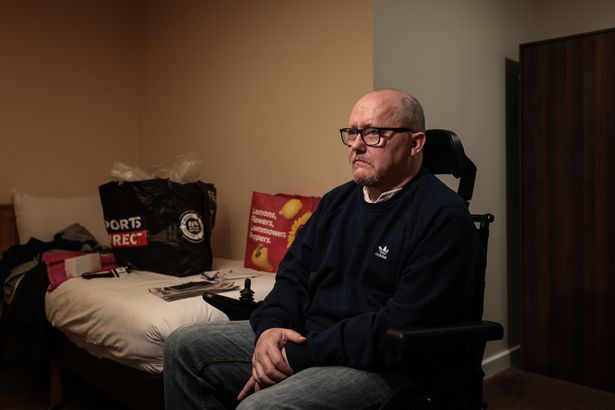 Stephen is living in the Britannia Hotel on Portland Street(Image: Kenny Brown | Manchester Evening News)
Stephen is living in the Britannia Hotel on Portland Street(Image: Kenny Brown | Manchester Evening News)
He told the Manchester Evening News he would like to work and to contribute to society. But the reality of his conviction, as well as a lack of support for newly released prisoners, means he is stuck – homeless and unable to rebuild his life.
Join the Manchester Evening News WhatsApp group HERE
“I know a lot of people won’t have any sympathy for me, and I understand it,” he said. “If I wasn’t in this position, I’d read about what happened and go, wow, that’s horrendous, that poor man.
“I didn’t expect the road would be paved with roses coming out. I’ve got a horrible murder charge. But I’ve been away for 17 years, educated myself, and I think I have a lot to offer.”
Stephen is desperate for the opportunity to rebuild his life.
Before he went to prison he spent time working to support young people, and knows his conviction may prevent that ever being possible again. Instead, he hopes to find a way to use skills and courses he took while in prison, as well as his lived experience, to help others.
“I was trained by Samaritans as a listener to try and reduce suicide and self-harm within prisons,” he said.
“I acted as a McKenzie friend for prisoners. I had all these trusted roles.
“I don’t want to be a drain on resources. I don’t want to be on benefits. I feel I’ve got a lot to offer and I want to work or volunteer within that area because I have lived experience of it.”
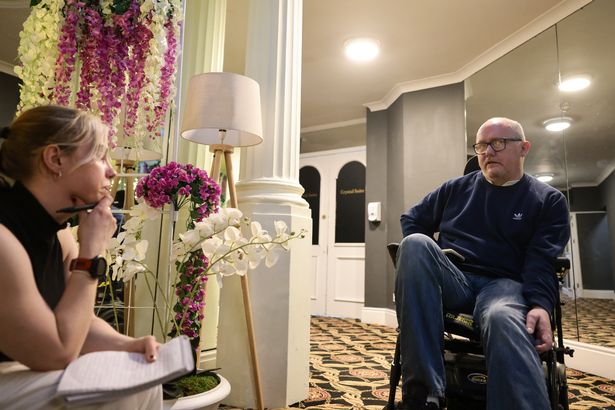 He told the M.E.N. he feels he has rehabilitated and wants the chance to work(Image: Kenny Brown | Manchester Evening News)
He told the M.E.N. he feels he has rehabilitated and wants the chance to work(Image: Kenny Brown | Manchester Evening News)
Stephen has strict rules he must adhere to, or he could go back to prison. Each week, he must report to probation, and he has an alcohol monitor on his ankle. He also needs to report to various benefit offices and job centres each week in order to be eligible for his small income. These tasks take up hours of his time each day.
“I was a fully functioning man when I went away. I’ve come out middle-aged, disabled – I don’t like to say vulnerable, but I am in a lot of ways.
“Learning to navigate Manchester in a wheelchair and all these new technologies has been really difficult. I don’t want to ask for a lot. But I want the chance to get stable.”
His efforts to move to a less expensive room have proven challenging – just last week he showed up at a new hotel, only to realise it was inaccessible for his wheelchair.
“I’m spending £1,600 a month on this room,” he said. “It doesn’t leave a lot. I’m eating sandwiches and fruit. I have no cooking facilities.
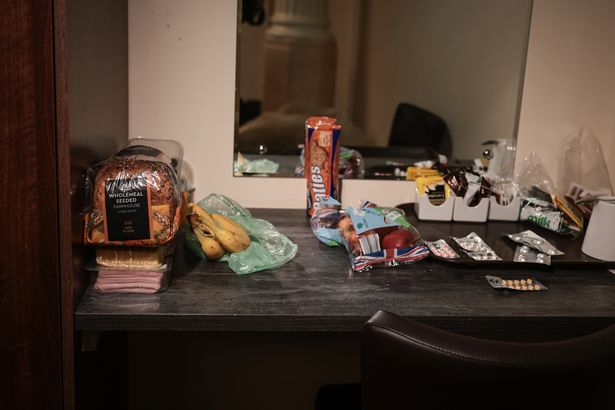 Stephen lives with no cooking facilities in his room(Image: Kenny Brown | Manchester Evening News)
Stephen lives with no cooking facilities in his room(Image: Kenny Brown | Manchester Evening News)
“I’ve come out to a housing crisis. It wasn’t like this when I went away. There’s no social housing, there’s not enough funding.
“All I want is my own accommodation, ground floor, disabled, accessible. I just want to live in a small community, a quiet place where I can slowly start to settle and re-acclimatise and integrate. But a community I can be part of. I think I’ve got a lot to offer to others.”
Stephen was convicted on a joint enterprise charge, which means individuals can be jointly convicted of a crime, even if they didn’t personally commit the act. Joint enterprise has its critics – an all-party parliamentary group on miscarriages of justice is currently collecting written evidence as to its effectiveness.
The 53-year-old now refutes his earlier guilty plea and claims he was not present when Mr Presley was killed. The Criminal Cases Review Commission (CCRC) told the M.E.N. no review was ongoing into his case.
But as his fight to clear his name goes on, he accepts he must try to reintegrate into society with the conviction hanging over him.
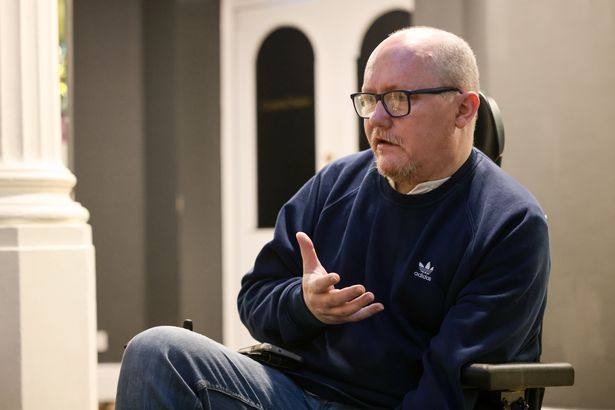 Stephen hopes to use his experiences to help others(Image: Kenny Brown | Manchester Evening News)
Stephen hopes to use his experiences to help others(Image: Kenny Brown | Manchester Evening News)
In the UK, data from the Ministry of Justice (MoJ) shows 25.5 per cent of offenders reoffend. Stephen said he believes some of the challenges he is facing are behind the struggle for many offenders to reintegrate.
“I really believe in rehabilitation,” he said. “Probation, adult social care, housing, nobody is supporting me. A lot of people become institutionalised. But that won’t be me.
“It’s really important to me that this isn’t a sob story. This isn’t woe is me. I don’t expect anything to be handed to me on a plate.
“All I’m asking for is accommodation that’s adaptable to my needs in a community where I can be accepted. I just want to live my life.
“I do understand the public view, but I’m not asking for special treatment. I just want to try and stabilise and show you can rehabilitate.”
A MoJ spokesperson said: “While we provide short-term accommodation for prison leavers to reduce the risk of offending, councils remain responsible for securing long-term housing.”
A Blackpool Council Spokesperson said: “As a council we do have a statutory duty to provide housing advice and assistance to people who are homeless, including those leaving prison, and who have a local connection to the area.
“We do not comment on individual cases.”
